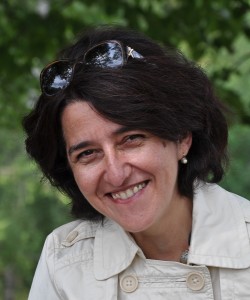by Anneli Aejmelaeus
Anna Kharanauli, Professor of Old Georgian Language and Textual Criticism at Tbilisi Javakhishvili State University, ended her research stay in Helsinki July 1, 2014, after five months as a KONE Fellow at the Helsinki Collegium for Advanced Studies.

This is the third time she has visited the University of Helsinki, where she has close long-term research cooperation with Anneli Aejmelaeus and her research group, concerning the textual history of the Septuagint (that is, Greek translation of the Hebrew Scriptures), which served as the source text for the old Georgian Bible translation.
This research cooperation goes back to the early 1990s and Germany, where the “Septuaginta-Unternehmen” (a project of the Academy of Sciences and Letters in Göttingen), of which Anneli was the director, was Anna’s first contact in the West. Anna continued her research work in Göttingen for several years, part of the time as an Alexander von Humboldt Fellow. With her insights into the history of the Georgian Bible translation as a daughter version of the Septuagint she was able to change the attitudes of Septuagint scholars towards the Georgian text and helped them to gain access to it.
Anna’s main research interest concerns the early Georgian Bible translation and its relation to the various textual traditions of the Septuagint, especially the so-called Lucianic recension or Antiochian text. Anna is currently working on a critical edition of the Georgian Book of Isaiah, which is one of those books in which she has discovered that the Georgian Bible translation was made on the basis of an early form of the Lucianic recension and can be used to elucidate the development of the Lucianic textual tradition. On the other hand, investigation into the Lucianic recension is also related to the study of the philological work undertaken by antique and medieval philological schools and grammarians (Aristarchus, Galen, Origen, Jerome, Augustine, as well as Georgian grammarians of the schools of Mount Athos and Antioch). Anna is thus not only interested in textual phenomena but also in the practical side of how text-editions – whether Homer or biblical recensions – were produced in Antiquity, what were their sources, their aims, and their methods, and what the various phases of the editorial work looked like in the manuscripts.
The cooperation between Anna and Anneli will continue next year when Anneli visits Tbilisi and takes part in the international symposium “From Scribal Error to Rewriting: How (Sacred) Texts May and May Not Be Changed,” April 30 – May 3 in Tbilisi, organized by Anna. They will also cooperate in supervising a doctoral student.
When asked the classical question “how do you like Finland?” Anna declares that she is “an absolute admirer of the Finns, a small nation that has not all too many natural resources but nevertheless makes everything bloom; they work hard but still have a relaxed and healthy attitude towards work and family.” The concept of the HCAS she finds wonderful and is grateful to its staff for their readiness to help and for making her feel at home. The interdisciplinary environment was enriching: it is good to learn from others about their research. As for the results of her research stay, she admits that she had again planned too much for the months in Helsinki but achieved what was realistically possible. To those around her she seemed to be working very intensively. She has enjoyed the good and relaxed atmosphere at the University of Helsinki and found joy in being able to do research like “ein Privatgelehrter,” free from all obligations.
We wish Anna a safe trip home and all the best in the future. Auf Wiedersehen – bis zum nächsten Mal!
